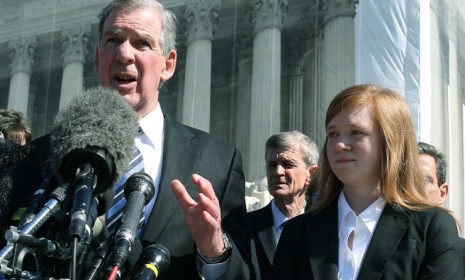The Supreme Court debates affirmative action: 3 takeaways
There's a decent chance that the conservative-leaning court could strike down affirmative-action admissions policies at public universities

A free daily email with the biggest news stories of the day – and the best features from TheWeek.com
You are now subscribed
Your newsletter sign-up was successful
On Wednesday, the Supreme Court heard oral arguments for Fisher v. Texas, a case that is widely considered to be the most serious legal challenge to affirmative action in nearly a decade. The case had been brought by Abigail Fisher, who claims that she was denied admission to the University of Texas at Austin because she is white. Under the state's enrollment system, the top 10 percent of students in every Texan high school is automatically accepted into the state university of their choice. However, the universities consider race and ethnicity, among other factors, when they fill up the rest of their incoming freshman classes, a policy that UT officials say is necessary to reach a "critical mass" of minority students and encourage diversity. Opponents of the program say it violates the Constitution's guarantee of equal protection under the law. Here, 3 takeaways from the case:
1. Affirmative action hangs in the balance
The Supreme Court could rule to either uphold UT's enrollment process, dismiss the case on narrow grounds, or strike down affirmative-action admissions policies at public universities. The latter decision would likely force private universities to abandon affirmative-action policies as well, since they receive federal funds. The court upheld affirmative-action admissions policies as recently as 2003, in the landmark decision Grutter v. Bollinger, but has since taken a decidedly conservative turn. Justice Anthony Kennedy, now considered the court's swing vote, was one of the four dissenters in Grutter.
The Week
Escape your echo chamber. Get the facts behind the news, plus analysis from multiple perspectives.

Sign up for The Week's Free Newsletters
From our morning news briefing to a weekly Good News Newsletter, get the best of The Week delivered directly to your inbox.
From our morning news briefing to a weekly Good News Newsletter, get the best of The Week delivered directly to your inbox.
2. Conservative justices were skeptical of affirmative action
The five conservative justices peppered UT's lawyers with skeptical questions about the university's admissions process. In particular, they complained that UT's definition of "critical mass" was too vague, and that it was difficult to tell whether the school was achieving its goal of encouraging diversity or simply fostering discrimination. And Justice Kennedy at one point expressed his discomfort with the university singling out minorities for admission. "What you're saying," Kennedy said, "is what counts is race above all." However, Kennedy "didn't fully tip his hand on how he was leaning in the case," says Jess Bravin at The Wall Street Journal.
3. Liberal justices were defensive
Justice Ruth Bader Ginsburg noted that UT's affirmative-action admission program is "more modest" than the one upheld in Grutter, while Justice Stephen Breyer bemoaned the fact that conservatives were considering striking down Grutter a mere nine years after it was handed down. Justice Sonia Sotomayor suggested that it should be left up to the university to decide how to encourage diversity, while accusing Fisher's lawyer of trying to "gut" affirmative action. In an ominous sign for affirmative action's supporters, the court's fourth liberal, Justice Elena Kagan, has recused herself from the case, because she worked on it previously as solicitor general. But if Kennedy swings liberal to create a 4-4 tie, UT's program will be upheld.
A free daily email with the biggest news stories of the day – and the best features from TheWeek.com
Sources: The Associated Press, The New York Times, Reuters, USA Today, The Wall Street Journal